Unit 10 I’ve had this bike for three years.Section B (2a-2d)教案
文档属性
| 名称 | Unit 10 I’ve had this bike for three years.Section B (2a-2d)教案 | 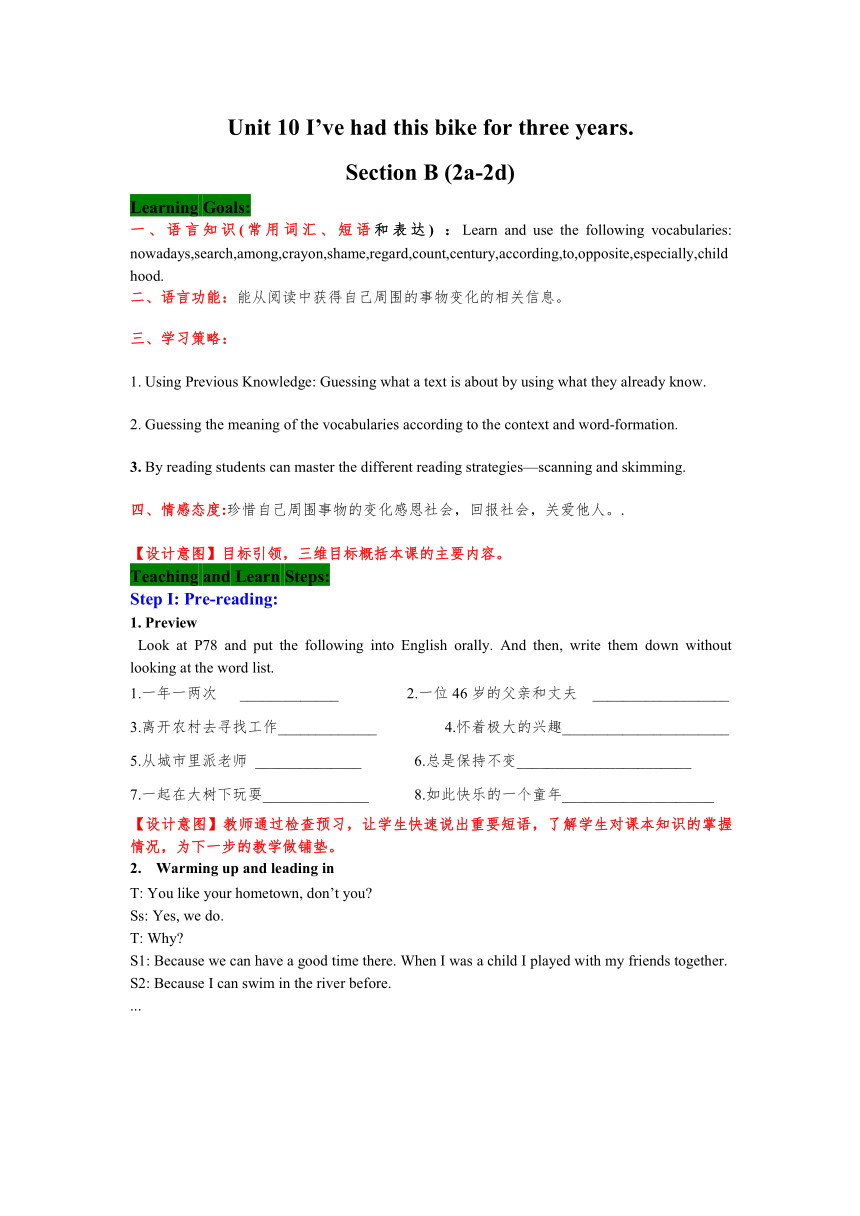 | |
| 格式 | zip | ||
| 文件大小 | 8.6MB | ||
| 资源类型 | 教案 | ||
| 版本资源 | 人教新目标(Go for it)版 | ||
| 科目 | 英语 | ||
| 更新时间 | 2015-06-18 08:09:41 | ||
图片预览

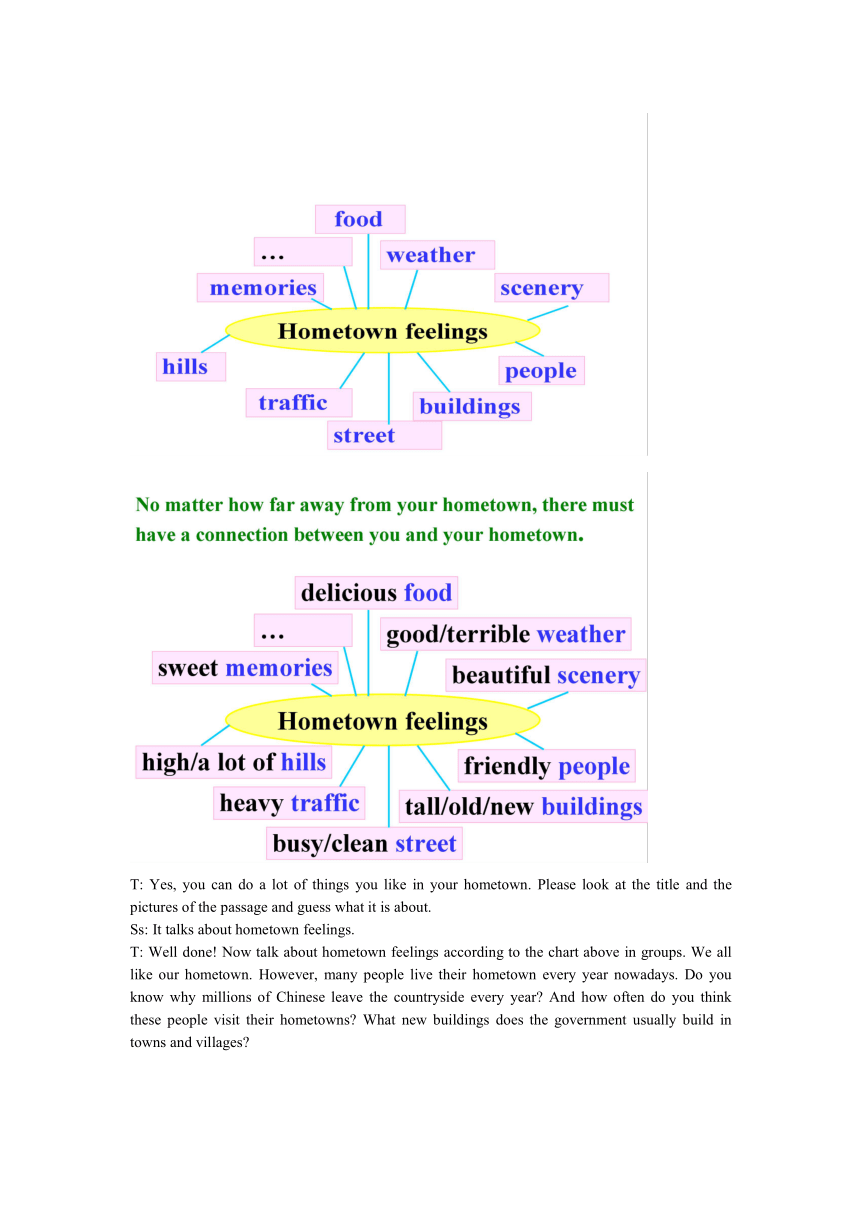
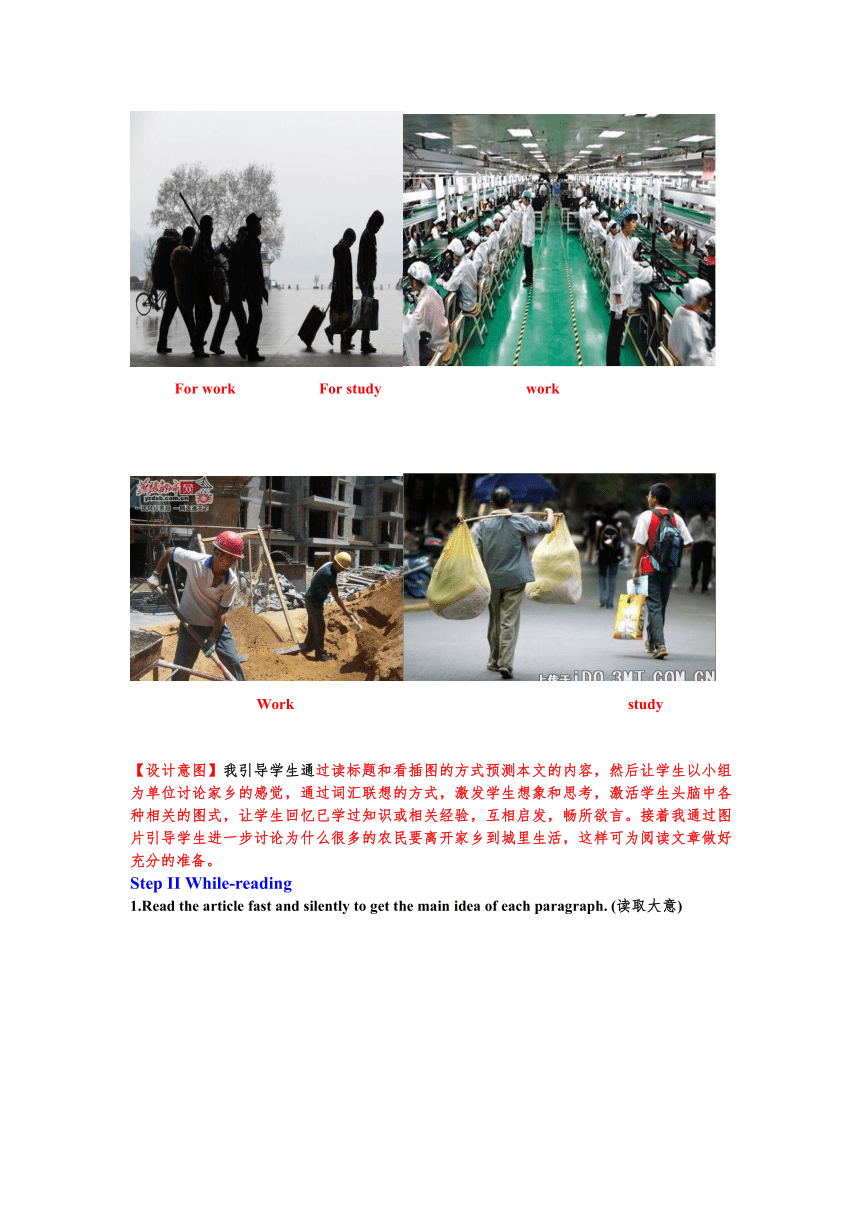
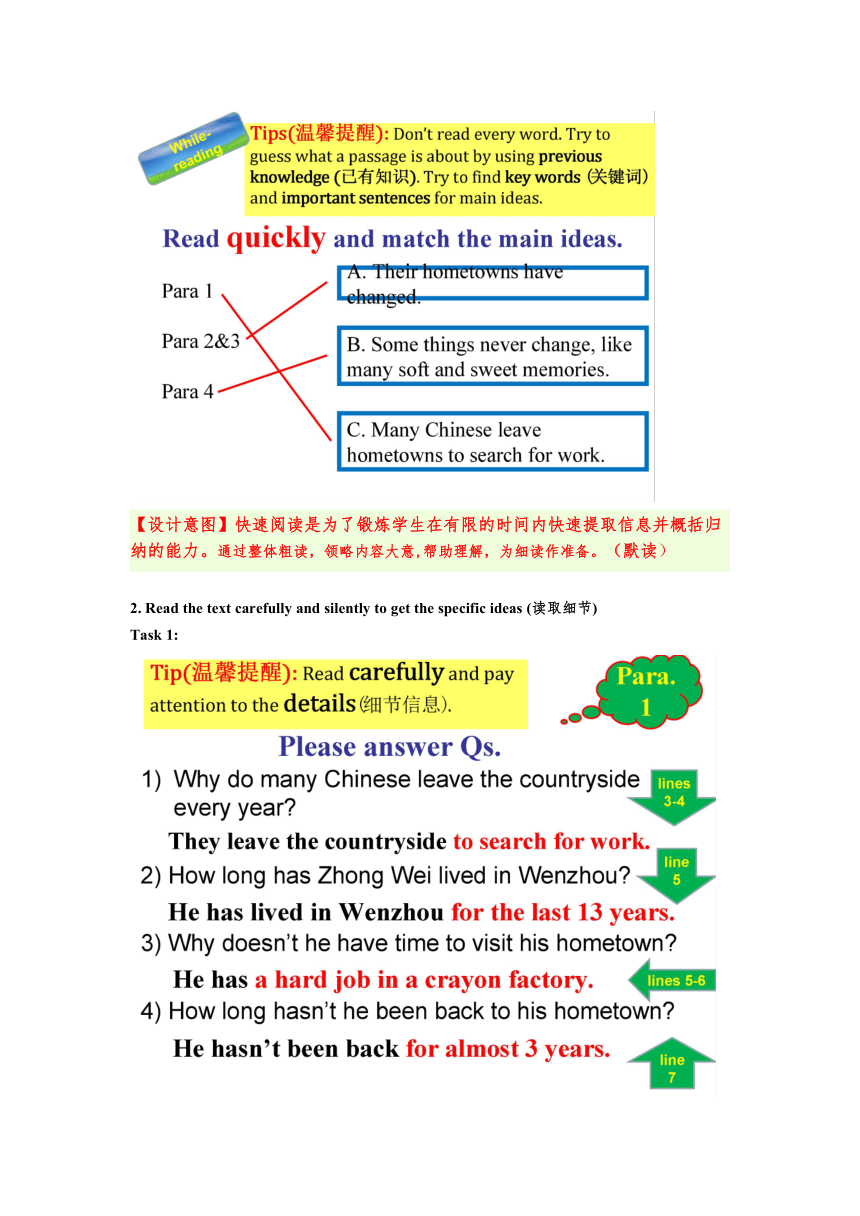
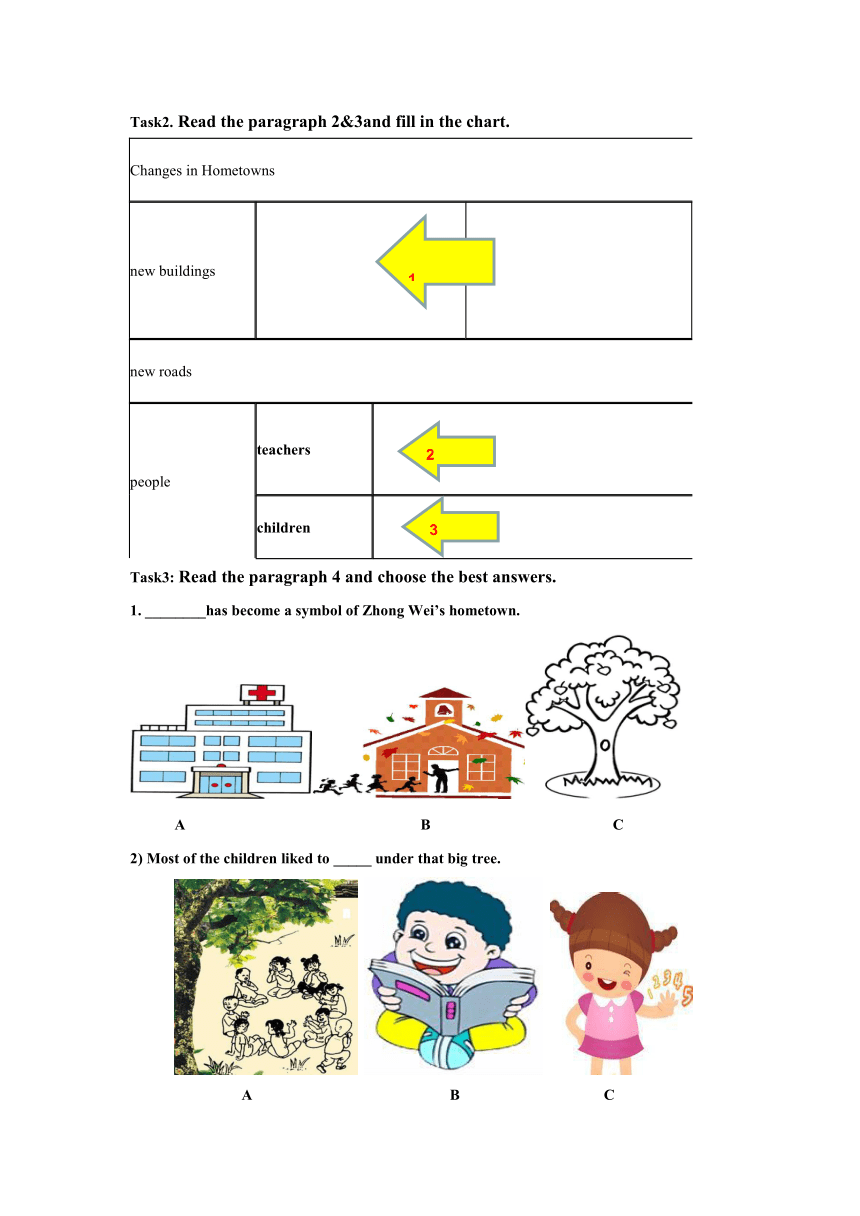
文档简介
Unit 10 I’ve had this bike for three years.
Section B (2a-2d)
Learning Goals:
一、语言知识(常用词汇、短语和表达) : ( http: / / www.21cnjy.com )Learn and use the following vocabularies: nowadays,search,among,crayon,shame,regard,count,century,according,to,opposite,especially,childhood.
二、语言功能:能从阅读中获得自己周围的事物变化的相关信息。
三、学习策略:
1. Using Previous Kno ( http: / / www.21cnjy.com )wledge: Guessing what a text is about by using what they already know.
2. Guessing the meani ( http: / / www.21cnjy.com )ng of the vocabularies according to the context and word-formation.
3. By reading ( http: / / www.21cnjy.com ) students can master the different reading strategies—scanning and skimming.
四、情感态度:珍惜自己周围事物的变化感 ( http: / / www.21cnjy.com )恩社会,回报社会,关爱他人。.
【设计意图】目标引领,三维目标概括本课的主要内容。
Teaching and Learn Steps:
Step I: Pre-reading:
1. Preview
Look at P78 and ( http: / / www.21cnjy.com )put the following into English orally. And then, write them down without looking at the word list.
一年一两次 _____________ 2.一位46岁的父亲和丈夫 __________________
离开农村去寻找工作_____________ 4.怀着极大的兴趣______________________
从城市里派老师 ______________ 6.总是保持不变_______________________
7.一起在大树下玩耍______________ 8.如此快乐的一个童年____________________
【设计意图】教师通过检查预习,让学生快速说出重要短语,了解学生对课本知识的掌握情况,为下一步的教学做铺垫。
Warming up and leading in
T: You like your hometown, don’t you
Ss: Yes, we do.
T: Why
S1: Because we ca ( http: / / www.21cnjy.com )n have a good time there. When I was a child I played with my friends together.
S2: Because I can swim in the river before.
...
T: Yes, you can do a l ( http: / / www.21cnjy.com )ot of things you like in your hometown. Please look at the title and the pictures of the passage and guess what it is about.
Ss: It talks about hometown feelings.
T: Well done! ( http: / / www.21cnjy.com ) Now talk about hometown feelings according to the chart above in groups. We all like our hometown. However, many people live their hometown every year nowadays. Do you know why millions of Chinese leave the countryside every year And how often do you think these people visit their hometowns What new buildings does the government usually build in towns and villages
( http: / / www.21cnjy.com ) ( http: / / www.21cnjy.com )
For work For study work
( http: / / www.21cnjy.com ) ( http: / / www.21cnjy.com )
Work study
【设计意图】我引导学生通 ( http: / / www.21cnjy.com )过读标题和看插图的方式预测本文的内容,然后让学生以小组为单位讨论家乡的感觉,通过词汇联想的方式,激发学生想象和思考,激活学生头脑中各种相关的图式,让学生回忆已学过知识或相关经验,互相启发,畅所欲言。接着我通过图片引导学生进一步讨论为什么很多的农民要离开家乡到城里生活,这样可为阅读文章做好充分的准备。
Step II While-reading
1.Read the article ( http: / / www.21cnjy.com )fast and silently to get the main idea of each paragraph. (读取大意)
【设计意图】快速阅读是为了锻炼学生在有限的时间内快速提取信息并概括归纳的能力。通过整体粗读,领略内容大意,帮助理解,为细读作准备。(默读)
2. Read the text ca ( http: / / www.21cnjy.com )refully and silently to get the specific ideas (读取细节)
Task 1:
Task2. Read the paragraph 2&3and fill in the chart.
Changes in Hometowns
new buildings
new roads
people teachers
children
Task3: Read the paragraph 4 and choose the best answers.
1. ________has become a symbol of Zhong Wei’s hometown.
( http: / / www.21cnjy.com ) ( http: / / www.21cnjy.com ) ( http: / / www.21cnjy.com )
A B C
2) Most of the children liked to _____ under that big tree.
( http: / / www.21cnjy.com ) ( http: / / www.21cnjy.com ) ( http: / / www.21cnjy.com )
A B C
Task4: 2b Find ex ( http: / / www.21cnjy.com )pressions in the passage that have the same meanings as these words and phrases.
look for _________ 2.consider _______________
across from ________________ 4.in one’s opinion ______________
go back ____________________ 6.changes___________________
7.area_______________________
【设计意图】细读过程分为三个任务。让学生在了解课文大意之后把握一些细节性的内容。能够更深刻透彻的掌握课文内容。
Step III Post-reading
Task 1:You’ve unde ( http: / / www.21cnjy.com )rstood the story. Let’s listen to the tape and read aloud after it. (Ss read after the tape )
【设计意图】让学生听音跟读,旨在调动眼 ( http: / / www.21cnjy.com )视听众感官深刻体会文章内容,更主要的是让学生通过跟读培养学生的语音语调,学着读出真正的地道的英语。并对学生掌握不准的词汇的读音进行学习或纠正。
Task2: Retell t ( http: / / www.21cnjy.com )he first paragraph according to the key words below of the pictures.
A. Retell the firs ( http: / / www.21cnjy.com )t paragraph according to the pictures and the key words below of the words..
HYPERLINK "http://www.21cnjy.com" ( http: / / www.21cnjy.com )
leave their hom ( http: / / www.21cnjy.com )etown for work for study
some...live in ( http: / / www.21cnjy.com )... . however, others... see... millions of...leave...to search for ...
among ...is ... he has lived ... find much time to ... used to... haven’t been back for...
B. Retell the secon ( http: / / www.21cnjy.com )d and third paragraph according to the main sentences and pictures.
( http: / / www.21cnjy.com )
large hospital new road
old primary school new school
hometowns... have ch ( http: / / www.21cnjy.com )anged... large hospitals and new road... have appeared. noticed... old primary school... new school.
C. Retell the fourth p ( http: / / www.21cnjy.com )aragraph according to the pictures and key words.
( http: / / www.21cnjy.com )
a big ol ( http: / / www.21cnjy.com )d tree play together under the big tree
according to ..., Some things ...never change. a big old tree ...opposite...the school... become quite a symbol of the place... children... like ...to play together ... such a happy childhood... left...soft and sweet memories.
【设计意图】给出关键词和图片让学生复述出所学内容,是语言的输出任务。学生通过速
读、细读回答完问题,又经过跟读和朗读大量的语言输入后,再进行复述。进一步提高学
生的综合运用语言的能力。
Task 3:
2c Complete the summ ( http: / / www.21cnjy.com )ary with words from the passage. You may need to change the forms
Many Chinese peop ( http: / / www.21cnjy.com )le these days leave their ____________ to work in the _______. They usually _______ to their hometowns one or two times a _______. Zhong Wei hasn’t been back in close to three years. He has been working in a _________ factory in Wenzhou for the past 13 years.
People like him ar ( http: / / www.21cnjy.com )e _________ in how their hometowns are changing. New buildings are often built by the _______. Zhong Wei thinks these changes are _______ because things need to change in order to become better. But he also thinks some things ___________change, and his hometown is still the place that holds all his childhood ___________.
【设计意图】通过对课文各段的复述,学生对课文内容有了进一步的了解和掌握,2c用
summary的方式对课文进一步巩固。
Step IV Summary the story and discuss the changes in our hometown.
Think of changes th ( http: / / www.21cnjy.com )at are happening in your town or city today. Which changes are generally good Which changes could be seen as bad
【设计意图】通过前面对的故事 ( http: / / www.21cnjy.com )的归纳总结,以及各种图片的对比,显现出家乡的巨大变化,许多变化给人民的工作生活带来了便利,但是随着社会的进步经济的发展,环境污染也日益严重,在发展经济的同时,我们要注意保护环境。本环节采用小组竞赛的方式,练习了学生的说的能力,属于语言的输出环节。
Step V情感体验
T: After read ( http: / / www.21cnjy.com )ing the passage, do you think Zhong Wei likes his hometown
S:Yes, he does.
T: One day if you go ( http: / / www.21cnjy.com )somewhere far to work, how often will you see your hometown
S1:Once a year.
S2:Every month.
S3:...
T:What will you do for your hometown
Ss:...
T: No matter what we d ( http: / / www.21cnjy.com )o , no matter where we are, we should try to make our hometown beautiful, do you think so
S: Yes.
【设计意图】:属于情感教育环节,教育学生要了解自己的家乡,热爱家乡,要努力使自己的家乡变得更漂亮,为家乡的发展做贡献。
Step V Inquiry into knowledge by translation
一.It’s a shame, but I just don’t have the time.
_________________________________________________________________
Shame 是不可数名词,意为“__________”,与不a定冠词 连用,表示“__________”。如:
他对自己所做的事不感到羞愧。
He felt _______ ________ for _________ he had done.
二.In my hometown , there was a big old tree opposite the school.
___________________________________________________________________________.
opposite 在这里作介 ( http: / / www.21cnjy.com )词,意为“______________”相当于_____________,常与名词一起构成介词短语,表示_____________。如:
他们住在银行对面.
They live _____________ the bank.
opposite 作为形容词时意为“___________”.如:
我们住在路对面。
We live on the ___________ side of the road.
opposite 作为副词时意为“____________”常与介词一起使用。如:
有一个老人住在对面。
There is an old man living __________ .
4.opposite 作为名词时意为‘“___________”,常与介词 of 一起使用。如:
高是矮的反义词。
“Tall” is the ___________ of “ short”
【设计意图】翻译探究主要是学生自主、合作、探究学习,学生在小组长的带领下积极思考,解答难题,教师统一答案,学生讨论难点,教师巡视点拨。
Step VI: The end of class test (当堂检测)
一、用所给单词的适当形式填空。
He built a house a___________ the tree.
Please r_________ me the book. I need it now.
It’s s__________ to tell a lie.
Sometimes we should r_________ our parents as our best friends.
Flowers are always welcomed, e________ in winter.
二. 根据汉语意思完成下面英语句子。
1.依我看,最好给我们老师做些贺卡。
_____________________________________
2. 我正考虑换份工作。
_____________________________________
3.根据他们的年龄把他们分成三组。
____________________________________
4. 在我家乡,在学校对面有一座山。
____________________________________
5.他的家乡永远是那个拥有他所有童年记忆的地方。
____________________________________
Homework:
1. Recite the article (2a). ( ★ )
2.Write what have changed in your hometown. ( ★★ )
亮点:
1. 给出关键词,便于学生复述课文。同时又复习本单元的重要句型,还锻炼了学生口头表达能力。
2. 读中活动的快读环节采用听与读相互结合的方式,边听边读(默读),培养学生快速阅读的能力。
3. 听后活动中的小组合作环节, ( http: / / www.21cnjy.com )组内讨论总结写作技巧,这种合作型的活动方式既培养了学生的合作意识,又激活了学生已有的生活经验,锻炼了学生的语言技能,能够达到较好的教学效果。
不足:本节课的听后活动所涉及的活动较多,因此在时间把握上,容易造成前松后紧。
使用建议:
1.综观本课的种种活动,无一例外地体现了师 ( http: / / www.21cnjy.com )生之间,生生之间良好的互动。尤其是,听后活动的小组讨论的环节,教师要正确引导,防止出现课堂失控现象。
2.让学生了解大自然,热爱大自然,保护环境,树立战胜困难的信心。
Answers
Preview
once or twice a year 2.a 46-year-old husband and father
leave the countryside to search for work
regard with great interest 5.sent teachers from the cities
always stay the same 7.play together under the big tree
8.such a happy childhood
Step II While-reading
Task3 1.a big old tree 2.play together
Inquiry into knowledge by translation
一、实在 遗憾,但是我就是没有时间。
羞耻,羞愧,惭愧;可耻的人或事,可惜的事
no shame; what
在我的家乡,在学校对面有一颗古老的大树。
在...对面;across from ;方位 opposite
在另一边的,对面的,相反的 opposite
在对面 opposite
相反的人或事,对面 opposite
The end of class test (当堂检测)
一、1. among 2. return 3.shame 4. regard 5. especially
二、1.As for me,it’s best to make some cards for our teacher.
2.I’m considering changing my job.
3.He divided themselves into 3 groups according to their age.
4. In my hometown, there was a hill opposite the school.
5.His hometown is s ( http: / / www.21cnjy.com )till the place that holds all his childhood memories.
1.
2
3
Hometown is a real great place for us. No matter where we have moved and how far away we are. we can't get away from homesickness (乡愁). We get homesick (想家的) because there are things that we love.
Section B (2a-2d)
Learning Goals:
一、语言知识(常用词汇、短语和表达) : ( http: / / www.21cnjy.com )Learn and use the following vocabularies: nowadays,search,among,crayon,shame,regard,count,century,according,to,opposite,especially,childhood.
二、语言功能:能从阅读中获得自己周围的事物变化的相关信息。
三、学习策略:
1. Using Previous Kno ( http: / / www.21cnjy.com )wledge: Guessing what a text is about by using what they already know.
2. Guessing the meani ( http: / / www.21cnjy.com )ng of the vocabularies according to the context and word-formation.
3. By reading ( http: / / www.21cnjy.com ) students can master the different reading strategies—scanning and skimming.
四、情感态度:珍惜自己周围事物的变化感 ( http: / / www.21cnjy.com )恩社会,回报社会,关爱他人。.
【设计意图】目标引领,三维目标概括本课的主要内容。
Teaching and Learn Steps:
Step I: Pre-reading:
1. Preview
Look at P78 and ( http: / / www.21cnjy.com )put the following into English orally. And then, write them down without looking at the word list.
一年一两次 _____________ 2.一位46岁的父亲和丈夫 __________________
离开农村去寻找工作_____________ 4.怀着极大的兴趣______________________
从城市里派老师 ______________ 6.总是保持不变_______________________
7.一起在大树下玩耍______________ 8.如此快乐的一个童年____________________
【设计意图】教师通过检查预习,让学生快速说出重要短语,了解学生对课本知识的掌握情况,为下一步的教学做铺垫。
Warming up and leading in
T: You like your hometown, don’t you
Ss: Yes, we do.
T: Why
S1: Because we ca ( http: / / www.21cnjy.com )n have a good time there. When I was a child I played with my friends together.
S2: Because I can swim in the river before.
...
T: Yes, you can do a l ( http: / / www.21cnjy.com )ot of things you like in your hometown. Please look at the title and the pictures of the passage and guess what it is about.
Ss: It talks about hometown feelings.
T: Well done! ( http: / / www.21cnjy.com ) Now talk about hometown feelings according to the chart above in groups. We all like our hometown. However, many people live their hometown every year nowadays. Do you know why millions of Chinese leave the countryside every year And how often do you think these people visit their hometowns What new buildings does the government usually build in towns and villages
( http: / / www.21cnjy.com ) ( http: / / www.21cnjy.com )
For work For study work
( http: / / www.21cnjy.com ) ( http: / / www.21cnjy.com )
Work study
【设计意图】我引导学生通 ( http: / / www.21cnjy.com )过读标题和看插图的方式预测本文的内容,然后让学生以小组为单位讨论家乡的感觉,通过词汇联想的方式,激发学生想象和思考,激活学生头脑中各种相关的图式,让学生回忆已学过知识或相关经验,互相启发,畅所欲言。接着我通过图片引导学生进一步讨论为什么很多的农民要离开家乡到城里生活,这样可为阅读文章做好充分的准备。
Step II While-reading
1.Read the article ( http: / / www.21cnjy.com )fast and silently to get the main idea of each paragraph. (读取大意)
【设计意图】快速阅读是为了锻炼学生在有限的时间内快速提取信息并概括归纳的能力。通过整体粗读,领略内容大意,帮助理解,为细读作准备。(默读)
2. Read the text ca ( http: / / www.21cnjy.com )refully and silently to get the specific ideas (读取细节)
Task 1:
Task2. Read the paragraph 2&3and fill in the chart.
Changes in Hometowns
new buildings
new roads
people teachers
children
Task3: Read the paragraph 4 and choose the best answers.
1. ________has become a symbol of Zhong Wei’s hometown.
( http: / / www.21cnjy.com ) ( http: / / www.21cnjy.com ) ( http: / / www.21cnjy.com )
A B C
2) Most of the children liked to _____ under that big tree.
( http: / / www.21cnjy.com ) ( http: / / www.21cnjy.com ) ( http: / / www.21cnjy.com )
A B C
Task4: 2b Find ex ( http: / / www.21cnjy.com )pressions in the passage that have the same meanings as these words and phrases.
look for _________ 2.consider _______________
across from ________________ 4.in one’s opinion ______________
go back ____________________ 6.changes___________________
7.area_______________________
【设计意图】细读过程分为三个任务。让学生在了解课文大意之后把握一些细节性的内容。能够更深刻透彻的掌握课文内容。
Step III Post-reading
Task 1:You’ve unde ( http: / / www.21cnjy.com )rstood the story. Let’s listen to the tape and read aloud after it. (Ss read after the tape )
【设计意图】让学生听音跟读,旨在调动眼 ( http: / / www.21cnjy.com )视听众感官深刻体会文章内容,更主要的是让学生通过跟读培养学生的语音语调,学着读出真正的地道的英语。并对学生掌握不准的词汇的读音进行学习或纠正。
Task2: Retell t ( http: / / www.21cnjy.com )he first paragraph according to the key words below of the pictures.
A. Retell the firs ( http: / / www.21cnjy.com )t paragraph according to the pictures and the key words below of the words..
HYPERLINK "http://www.21cnjy.com" ( http: / / www.21cnjy.com )
leave their hom ( http: / / www.21cnjy.com )etown for work for study
some...live in ( http: / / www.21cnjy.com )... . however, others... see... millions of...leave...to search for ...
among ...is ... he has lived ... find much time to ... used to... haven’t been back for...
B. Retell the secon ( http: / / www.21cnjy.com )d and third paragraph according to the main sentences and pictures.
( http: / / www.21cnjy.com )
large hospital new road
old primary school new school
hometowns... have ch ( http: / / www.21cnjy.com )anged... large hospitals and new road... have appeared. noticed... old primary school... new school.
C. Retell the fourth p ( http: / / www.21cnjy.com )aragraph according to the pictures and key words.
( http: / / www.21cnjy.com )
a big ol ( http: / / www.21cnjy.com )d tree play together under the big tree
according to ..., Some things ...never change. a big old tree ...opposite...the school... become quite a symbol of the place... children... like ...to play together ... such a happy childhood... left...soft and sweet memories.
【设计意图】给出关键词和图片让学生复述出所学内容,是语言的输出任务。学生通过速
读、细读回答完问题,又经过跟读和朗读大量的语言输入后,再进行复述。进一步提高学
生的综合运用语言的能力。
Task 3:
2c Complete the summ ( http: / / www.21cnjy.com )ary with words from the passage. You may need to change the forms
Many Chinese peop ( http: / / www.21cnjy.com )le these days leave their ____________ to work in the _______. They usually _______ to their hometowns one or two times a _______. Zhong Wei hasn’t been back in close to three years. He has been working in a _________ factory in Wenzhou for the past 13 years.
People like him ar ( http: / / www.21cnjy.com )e _________ in how their hometowns are changing. New buildings are often built by the _______. Zhong Wei thinks these changes are _______ because things need to change in order to become better. But he also thinks some things ___________change, and his hometown is still the place that holds all his childhood ___________.
【设计意图】通过对课文各段的复述,学生对课文内容有了进一步的了解和掌握,2c用
summary的方式对课文进一步巩固。
Step IV Summary the story and discuss the changes in our hometown.
Think of changes th ( http: / / www.21cnjy.com )at are happening in your town or city today. Which changes are generally good Which changes could be seen as bad
【设计意图】通过前面对的故事 ( http: / / www.21cnjy.com )的归纳总结,以及各种图片的对比,显现出家乡的巨大变化,许多变化给人民的工作生活带来了便利,但是随着社会的进步经济的发展,环境污染也日益严重,在发展经济的同时,我们要注意保护环境。本环节采用小组竞赛的方式,练习了学生的说的能力,属于语言的输出环节。
Step V情感体验
T: After read ( http: / / www.21cnjy.com )ing the passage, do you think Zhong Wei likes his hometown
S:Yes, he does.
T: One day if you go ( http: / / www.21cnjy.com )somewhere far to work, how often will you see your hometown
S1:Once a year.
S2:Every month.
S3:...
T:What will you do for your hometown
Ss:...
T: No matter what we d ( http: / / www.21cnjy.com )o , no matter where we are, we should try to make our hometown beautiful, do you think so
S: Yes.
【设计意图】:属于情感教育环节,教育学生要了解自己的家乡,热爱家乡,要努力使自己的家乡变得更漂亮,为家乡的发展做贡献。
Step V Inquiry into knowledge by translation
一.It’s a shame, but I just don’t have the time.
_________________________________________________________________
Shame 是不可数名词,意为“__________”,与不a定冠词 连用,表示“__________”。如:
他对自己所做的事不感到羞愧。
He felt _______ ________ for _________ he had done.
二.In my hometown , there was a big old tree opposite the school.
___________________________________________________________________________.
opposite 在这里作介 ( http: / / www.21cnjy.com )词,意为“______________”相当于_____________,常与名词一起构成介词短语,表示_____________。如:
他们住在银行对面.
They live _____________ the bank.
opposite 作为形容词时意为“___________”.如:
我们住在路对面。
We live on the ___________ side of the road.
opposite 作为副词时意为“____________”常与介词一起使用。如:
有一个老人住在对面。
There is an old man living __________ .
4.opposite 作为名词时意为‘“___________”,常与介词 of 一起使用。如:
高是矮的反义词。
“Tall” is the ___________ of “ short”
【设计意图】翻译探究主要是学生自主、合作、探究学习,学生在小组长的带领下积极思考,解答难题,教师统一答案,学生讨论难点,教师巡视点拨。
Step VI: The end of class test (当堂检测)
一、用所给单词的适当形式填空。
He built a house a___________ the tree.
Please r_________ me the book. I need it now.
It’s s__________ to tell a lie.
Sometimes we should r_________ our parents as our best friends.
Flowers are always welcomed, e________ in winter.
二. 根据汉语意思完成下面英语句子。
1.依我看,最好给我们老师做些贺卡。
_____________________________________
2. 我正考虑换份工作。
_____________________________________
3.根据他们的年龄把他们分成三组。
____________________________________
4. 在我家乡,在学校对面有一座山。
____________________________________
5.他的家乡永远是那个拥有他所有童年记忆的地方。
____________________________________
Homework:
1. Recite the article (2a). ( ★ )
2.Write what have changed in your hometown. ( ★★ )
亮点:
1. 给出关键词,便于学生复述课文。同时又复习本单元的重要句型,还锻炼了学生口头表达能力。
2. 读中活动的快读环节采用听与读相互结合的方式,边听边读(默读),培养学生快速阅读的能力。
3. 听后活动中的小组合作环节, ( http: / / www.21cnjy.com )组内讨论总结写作技巧,这种合作型的活动方式既培养了学生的合作意识,又激活了学生已有的生活经验,锻炼了学生的语言技能,能够达到较好的教学效果。
不足:本节课的听后活动所涉及的活动较多,因此在时间把握上,容易造成前松后紧。
使用建议:
1.综观本课的种种活动,无一例外地体现了师 ( http: / / www.21cnjy.com )生之间,生生之间良好的互动。尤其是,听后活动的小组讨论的环节,教师要正确引导,防止出现课堂失控现象。
2.让学生了解大自然,热爱大自然,保护环境,树立战胜困难的信心。
Answers
Preview
once or twice a year 2.a 46-year-old husband and father
leave the countryside to search for work
regard with great interest 5.sent teachers from the cities
always stay the same 7.play together under the big tree
8.such a happy childhood
Step II While-reading
Task3 1.a big old tree 2.play together
Inquiry into knowledge by translation
一、实在 遗憾,但是我就是没有时间。
羞耻,羞愧,惭愧;可耻的人或事,可惜的事
no shame; what
在我的家乡,在学校对面有一颗古老的大树。
在...对面;across from ;方位 opposite
在另一边的,对面的,相反的 opposite
在对面 opposite
相反的人或事,对面 opposite
The end of class test (当堂检测)
一、1. among 2. return 3.shame 4. regard 5. especially
二、1.As for me,it’s best to make some cards for our teacher.
2.I’m considering changing my job.
3.He divided themselves into 3 groups according to their age.
4. In my hometown, there was a hill opposite the school.
5.His hometown is s ( http: / / www.21cnjy.com )till the place that holds all his childhood memories.
1.
2
3
Hometown is a real great place for us. No matter where we have moved and how far away we are. we can't get away from homesickness (乡愁). We get homesick (想家的) because there are things that we love.
同课章节目录
- Unit 1 What's the matter?
- Section A
- Section B
- Unit 2 I'll help to clean up the city parks.
- Section A
- Section B
- Unit 3 Could you please clean your room?
- Section A
- Section B
- Unit 4 Why don't you talk to your parents?
- Section A
- Section B
- Unit 5 What were you doing when the rainstorm came
- Section A
- Section B
- Review of Units 1-5
- Unit 6 An old man tried to move the mountains.
- Section A
- Section B
- Unit 7 What's the highest mountain in the world?
- Section A
- Section B
- Unit 8 Have you read Treasure Island yet?
- Section A
- Section B
- Unit 9 Have you ever been to a museum?
- Section A
- Section B
- Unit 10 I've had this bike for three years.
- Section A
- Section B
